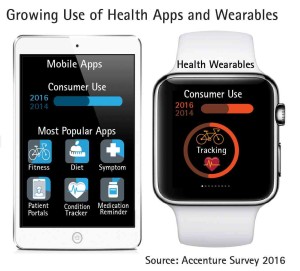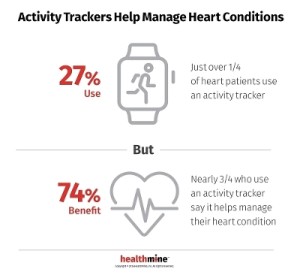 One in 3 consumers is using mobile apps for health, doubling from 16% in 2014 to 33% in 2016, according to a survey from Accenture released during HIMSS 2016 conference. The proportion of people donning a wearable device for health more than doubled, from 9% to 21% between 2014-15.
One in 3 consumers is using mobile apps for health, doubling from 16% in 2014 to 33% in 2016, according to a survey from Accenture released during HIMSS 2016 conference. The proportion of people donning a wearable device for health more than doubled, from 9% to 21% between 2014-15.
Part of this response is due to more physicians asking their patients — consumers — to adopt a wearable to track a health or fitness metric. One in 5 consumers said their doctor “prescribed” the use of a wearable, and 76% of these people followed the doctor’s recommendation. Most consumers and doctors said using wearables can help people better engage with their health.
Some of the key statistics are that:
- 4 in 10 consumers who use health apps discussed or shared mobile app data with their doctor in the past year
- The most popular health apps covered fitness (59%), diet and nutrition (52%), symptom navigation (36%), and patient portal use (28%)
- Nearly all consumers are comfortable sharing the data generated by apps and wearables with their physicians, but fewer would be willing to share data with their health plans (63%) and employers (31%).
“Healthcare providers will need to weave digital capabilities into the core of their business model so that it becomes embedded in everything ng they do,” said Dr. Kaveh Safavi, leader of Accenture’s global health practice,
Accenture’s survey covered about 8,000 consumers in seven countries between November 2015 and January 2016, including 2,225 US adults.
 Health Populi’s Hot Points: The 1 in 3 people using apps statistic is in the ballpark with another survey from HealthMine. This poll found that nearly one-third of all heart patients used some digital health tool: 50% an activity tracker, 48% a blood pressure app, 47% a heart rate app, and 38%, a nutrition app.
Health Populi’s Hot Points: The 1 in 3 people using apps statistic is in the ballpark with another survey from HealthMine. This poll found that nearly one-third of all heart patients used some digital health tool: 50% an activity tracker, 48% a blood pressure app, 47% a heart rate app, and 38%, a nutrition app.
Medscape released a survey yesterday on consumers and physicians’ views on patient engagement and technologies. On the physician front of “prescribing” or recommending health apps and wearables, releasing the survey results yesterday at HIMSS 2016. The study found that 69% of physicians do not yet recommend a wearable device like a Fitbit or a smartwatch (but 31% do).
There is growing interest among providers in engaging consumer in their personal health. Some worry about the ability of patient generated to flow into EHRs, and others are concerned there will be too many data points and granularity generated by the “little data.”
There’s no doubt that employers and sponsors who pay for health insurance are increasingly keen to motivate consumers to track health and “make” wellness. As an example of this trend, see my read earlier this week on the announcement by UnitedHealthcare and Qualcomm Life, joining together to bring the Motion activity tracker to UHC plan members and employers.





 Interviewed live on BNN Bloomberg (Canada) on the market for GLP-1 drugs for weight loss and their impact on both the health care system and consumer goods and services -- notably, food, nutrition, retail health, gyms, and other sectors.
Interviewed live on BNN Bloomberg (Canada) on the market for GLP-1 drugs for weight loss and their impact on both the health care system and consumer goods and services -- notably, food, nutrition, retail health, gyms, and other sectors. Thank you, Feedspot, for
Thank you, Feedspot, for  As you may know, I have been splitting work- and living-time between the U.S. and the E.U., most recently living in and working from Brussels. In the month of September 2024, I'll be splitting time between London and other parts of the U.K., and Italy where I'll be working with clients on consumer health, self-care and home care focused on food-as-medicine, digital health, business and scenario planning for the future...
As you may know, I have been splitting work- and living-time between the U.S. and the E.U., most recently living in and working from Brussels. In the month of September 2024, I'll be splitting time between London and other parts of the U.K., and Italy where I'll be working with clients on consumer health, self-care and home care focused on food-as-medicine, digital health, business and scenario planning for the future...